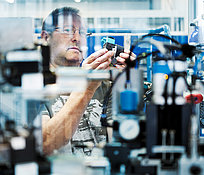
KNF 2046. A Vision for the Future
In 1946, when KNF is founded as a cylinder grinding business in the center of Freiburg, the rubble left over from WWII bombings still lies all around the makeshift workshop. At that time, it is inconceivable that 75 years later, the same company will be producing diaphragm pumps that orbit the earth in the ISS, collect climate data in the Amazon and aid in the development of artificial organs. The only place where KNF hasn’t been yet is Mars!
The family-owned company has always had its eyes on the future, looking out for new markets and gauging opportunities for innovative technologies. But what do the coming years leading up to the 100th anniversary hold in store? Just as in 1946, no one can really know what will happen. Nevertheless, CEO Martin Becker hazards a prediction.
KNF in the year 2046. The door to the production hall opens. 3D printers are quietly whirring away, almost inaudibly. One printer is churning out a new wearing part that a KNF customer just ordered by scanning the old one with their smartphone scan. But even that is often no longer necessary. The diaphragm pumps are now able to autonomously detect when they need maintenance or when a wearing part needs exchanging and send the respective data to the 3D printer if necessary. The 3D printer can either be at KNF or even at the customer’s location.
Martin Becker is confident that in 25 years’ time, KNF diaphragm pumps will no longer “just” transfer, evacuate and create pressure. “They will be able to measure, control and repair themselves, and identify faults before they arise,” says the CEO. Sensors, functional materials and a digital connection to the KNF cloud will have turned pumps into complex devices that collect, receive and process information on their own. Today, we can only guess what artificial intelligence will be able to do in the future.
But let’s go back to the future – to 2046. Highly skilled experts are needed to manufacture these “mini computers.” Thanks to 100 years of experience and the knowledge of many longstanding KNF staff members, the company has remained a technology leader. But competition at the top is fierce. Interdisciplinary teamwork and close collaboration with the customer are more important than ever. Though communication is a little different to how it was in the “good old days,” back in the 2020s.
A project meeting: Everyone joins the digital meeting. Today, the team is focused on the details of a customized product. The KNF engineer brings up a hologram of the pump and shifts to an internal view of the design. He updates the team on the status of the development and immediately applies his colleagues’ ideas and suggestions to the 3D model. An hour into the meeting, the most important issues have been resolved, everyone leaves the meeting to find themselves wherever they were working before – a co-working space in Hamburg, a village in Southern Germany, the Group Board’s headquarters, the KNF development department in Switzerland, an office somewhere outside of Toronto.
KNF witnessed firsthand the effectiveness of virtual collaboration during the COVID-19 pandemic. Martin Becker is sure that “in 25 years, flexible, mobile and virtual work will have become commonplace. KNF will be present all around the world while being more closely connected than ever before.” Even if virtual and augmented reality of the kind described in our imaginary example never completely replace in-person meetings, business trips will be less frequent. This will not only make us faster and more effective, and thus better equipped against the competition, it will also help us save resources.

Even today, in 2021, sustainability is key at KNF, and it will continue to permeate all areas of the family-owned company, resulting in more recycled materials, even smaller pumps using less material, and more environmentally friendly technologies. In 25 years, KNF diaphragm pumps will require up to 80% less energy than they do today. This trend is already clear.
And where will the KNF diaphragm pumps of the future be employed? There are some promising new applications in the areas of food production, climate and green energy. Medical equipment, too, will remain an important pillar – particularly in view of an aging society and ever more personalized medical treatment options. “Our products will continue to save lives, improve quality of life and make a long-term contribution to the conservation of a liveable environment,” summarizes Martin Becker. And who knows – maybe KNF pumps will be on board when the first humans set out for Mars.

KNF Blog Knowledge Flows
Follow the latest trends and stories on how diaphragm pump technology drives evolution in the market.




